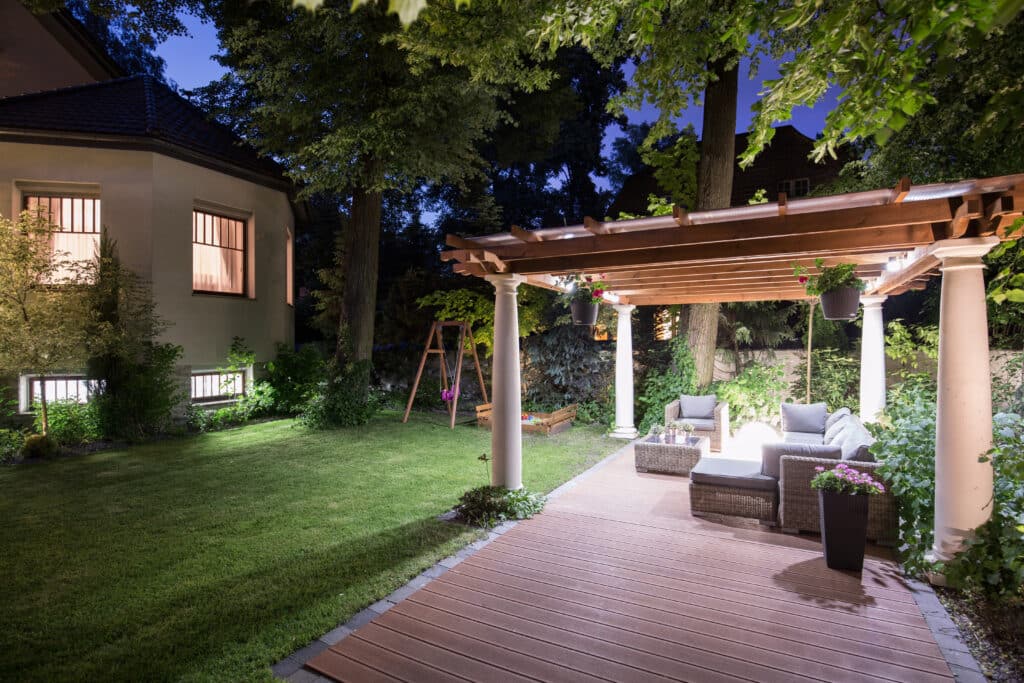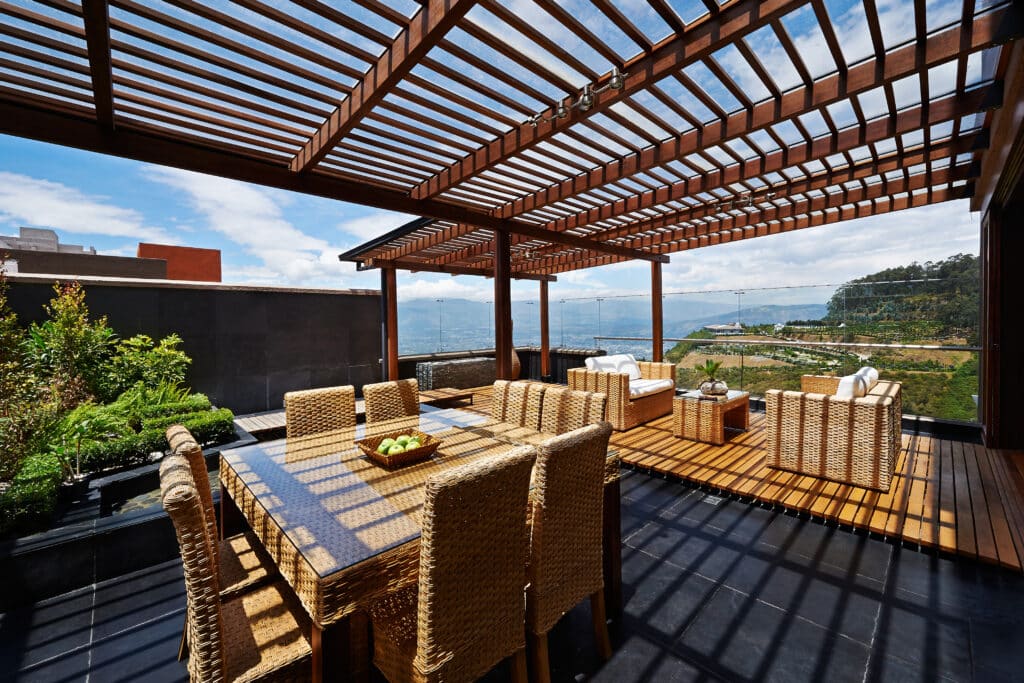Last month we answered some of our most frequently asked pergola questions, but we were left with many more unaddressed. This month we take a closer look at some oft-asked queries about the popular structures, even delving into the world of DIY.

Can Pergolas Have Roofs?
This pergola question always makes us smile just a little. A pergola is usually defined as an outdoor structure that uses freestanding columns or another structure to support a roof. While homeowners have a lot of freedom about what sits atop the structural pillars, the point of a pergola is almost always to have some kind of roof.
Very often, these are dramatically slatted or consist of just a trellis of beams, but pergola roofs can be solid too. More often, homeowners instead incorporate a canopy or screen into their pergola design. This allows people in rainy areas to have covered seating areas during mild rain showers and people in areas that get a lot of sun to have shaded oases on their property.
Are Pergola Kits Worth It?
For those with a DIY bent, pergola kits are commercially available. These vary dramatically by manufacturer and model. Some come with pre-cut wood and hardware while excluding retractable canopies while others include hardware, brackets, and canopies but require the purchaser to buy the wood separately.
Kits can come with a variety of features, like trellises or even outlets, though usually customization is limited. Kits are cheaper than a professional installation, but homeowners should know that construction is usually not a one-person job and you will need your own tools. When building a pergola yourself, the dangers of installation fall on the property owner instead of on professional contractors.
Pergola questions about DIY kits usually come down to a desire to minimize expenses. Kits can do so only if nothing goes wrong in the installation process. Kits can still cost a pretty penny, and if the construction takes longer than anticipated or if any of the customized pieces are damaged, the motivating financial edge can be lost. Consider carefully whether you want professional installation or to take care of it yourself.

Which Timber Is Best for Making Pergolas?
Whether you use a kit or contract a professional to install your pergola, you will need to choose the wood you want to use. Wood-related pergola questions are a matter of personal preference, budget, installation method, and climate. Lighter woods are easier to cut, lift, and work with on your own without calling in the cavalry, but they may not hold up as well in your environment. More exotic woods may require special equipment or woodworking tools but may last longer.
We encourage you to speak with our experts in your research for the best pergola wood, but in the meantime, here are few common types of wood used for building the outdoor structures:
- Redwood is long-lasting, easy to work with, and looks stunning.
- Western Red Cedar is resistant to insect damage because of its natural oils, making it a common building material choice for pergolas.
- European Green Oak is also naturally resistant to insects, rot, and moisture making its maintenance minimal. This durable wood turns an elegant silvery gray as it ages.
- Hemlock is stable, lightweight, and reasonably priced. It is most commonly used for light framing in addition to pergola construction.
- Douglas Fir is relatively harder than other coniferous woods. It has minimal shrinkage, giving it excellent stability.
- Tropical Hardwoods (woods like Kapa, Mahogany, Ipe, and Teak) perform very well in wet weather and are naturally insect-repellent.
- Pressure-treated wood is sturdy and can withstand significant force.

Do I Need a Permit to Build a Pergola?
The answer to this pergola question is dependent on location. The answer is generally no, and homeowners looking to build a pavilion or gazebo are more likely to need a permit than those wanting to build a pergola because of the difference in roof structure.
While roughly 85% of American homeowners do not need a permit to build a pergola, areas where hurricanes or earthquakes threaten are more likely to require one. Before you build, check local ordinances and make sure you are compliant. If you contract out your installation, your builder will know if a permit is necessary. If it is, don’t panic. The process is usually straightforward, requiring a small fee and filling out some paperwork.
Does Bronco Fence Install Pergolas?
This may be our favorite pergola question. At Bronco Fence, we love adding to the beauty and value of a property by installing customized pergola. Take a look at some of our pergola projects as you look for the right contractor for you. We make the process painless and punctual so you can enjoy all your new pergola has to offer.

